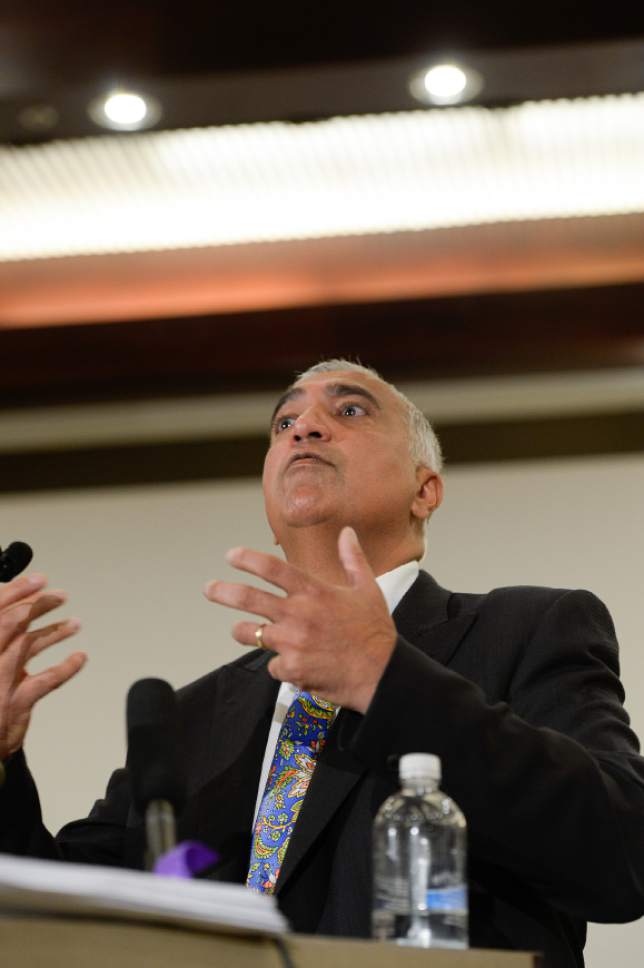This is an archived article that was published on sltrib.com in 2015, and information in the article may be outdated. It is provided only for personal research purposes and may not be reprinted.
Two high-profile police shootings in Salt Lake City in 2014 piqued public interest as well as cast shadows across the Police Civilian Review Board, created, ostensibly, as a transparent and independent finder of facts.
The June officer-involved shooting of a dog named Geist and the August shooting death of Dillon Taylor, 20, produced two reports from the review board: one public; the other private. The disparity begs the question: Is the public interest best served by releasing details of a dog's death but not that of a young, unarmed man?
Both deaths spurred public outcry and demonstrations. In the case of Geist, Salt Lake City quickly made public the review board's report and ruling that Detective Brett Olsen's shooting of the 2-year-old Weimaraner in its owner's fenced yard was justified.
But in the case of Taylor, the review board refused to make public its report.
In his investigation, Salt Lake County District Attorney Sim Gill found that Officer Bron Cruz legally shot and killed Taylor because the officer feared for his life, believing the suspect was armed and dangerous. In doing so, the D.A. made public various details of the shooting, including a transcript of the original 911 tape that identified an armed man and a transcript of the police interview with Cruz.
The officer's body camera captured the shooting in the parking lot at a 7-Eleven store at 2101 S. State. That video also was released to the public.
After the fatal shooting, it quickly became clear that Taylor was not armed.
But the Civilian Review Board's attorney — a member of the city attorney's staff — denied a request for its investigation report by The Salt Lake Tribune under the Government Records Access and Management Act (GRAMA). The reason for the denial was essentially that the report was a private personnel record not subject to disclosure.
The newspaper's subsequent appeal was denied by the city's chief administrator, David Everitt, on the same grounds.
The Tribune has appealed the denial to the State Records Committee. A hearing is pending.
An attorney who represents Taylor's aunt, Gina Thayne, said she finds the review board's action puzzling.
"That's ridiculous," said Kelly Fowler. "For them to have this information and not release it to the public defeats the whole purpose of a Civilian Review Board."
Nonetheless, the municipality has discretion to release private review board reports, said Everitt, who also is Mayor Ralph Becker's chief of staff.
"The city's voluntary disclosure of the Geist report does not mean that such reports, as a class, are public records, because GRAMA authorizes the city, using a case by case analysis, voluntarily to disclose a record that is properly classified as private," Everitt wrote in his denial.
He declined further comment.
According to the mission statement posted on its website, the Civilian Review Board "is critical in ensuring police accountability, as well as protection for police who have been falsely accused. It will, in the long run, promote greater trust between the police department and the community it serves."
Although the review board did make public its report on Geist, former Mayor Rocky Anderson, an attorney who represents the dog's owner, Sean Kendall, said the board's members were not given proper advice from the city attorney on how to interpret the law when it found the shooting justified.
Police were responding to a call of a missing 3-year-old child, according to the review board's report. When Olsen got to Kendall's Sugar House residence, Kendall was not home. The officer entered the fenced backyard and the dog became aggressive, according to the report. Fearing he might be bitten, Olsen shot the dog.
But Anderson, who as mayor was instrumental in creating the Civilian Review Board, said Kendall's house was too far from the missing child's home — a quarter mile — to meet the proper legal standard for a warrantless search.
On behalf of Kendall, Anderson has filed a notice of intent to sue the city.
"If there is an emergency, that doesn't mean you can search everybody's yard and home, willy-nilly," Anderson said. "The review board used the wrong legal standard."
Anderson added that it is apparent the Police Civilian Review Board should have a legal adviser outside the city attorney's office.
Further, Anderson said, the board should make public all its reports. Such a policy would be good for the public as well as the police department. "It serves everybody's interest to publicly disclose these reports."











